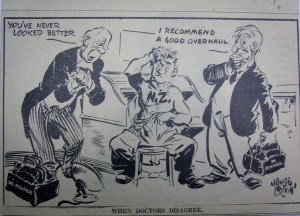Written by guest blogger, John Stewart.
My article, “William Beveridge in New Zealand: Social Security and World Security,” derives from research I carried out on what became a complementary project, which examined aspects of New Zealand and British welfare history in the 1930s and 1940s. Much of the archival work for the original project involved materials held at the British Library of Political and Economic Science (BLPES) in London, England. One of the archivists noted that I was interested in New Zealand and alerted me to the then unclassified material in the papers of William Beveridge, often described as the architect of the British welfare state. The “discovery” of unexamined archival records is, of course, every historian’s dream come true. On examination it transpired that the material pertained to a trip Beveridge had made to New Zealand and Australia in 1948. The existing historiography made a few references to the trip but it had not, it soon became apparent, been dealt with in detail. To supplement the BLPES material I then obtained further records of Beveridge’s trip from the University of Otago.
The occasion of Beveridge’s trip, on which he was accompanied by his wife, was an invitation by the University of Otago to deliver a series of lectures and talks on mutually agreed topics. Beveridge was by this stage internationally viewed as an authority on social welfare and many of his talks were on this subject. This also reflected concerns in New Zealand itself about the direction of its welfare state which, by the standards of the time, was very advanced while being criticized especially from the political right. Consequently, Beveridge’s views were much sought after and he did not draw back from criticizing what he saw as the shortcomings of the New Zealand system, especially its generous health and pension schemes. However Beveridge was by now just as interested in international affairs and the promotion of world peace and insisted that this be the subject of some of his speeches and talks. One of the central points of my argument is that Beveridge saw world security and social security as interlinked — you could not have one without the other. This has been neglected up until this point in the otherwise extensive historical writing on Beveridge. Furthermore, this episode can also be seen as contributing to the well-established argument about the existence at this time of a “Greater Britain” wherein Britain and the Dominions retained intimate links, and not least through the exchange of ideas about welfare policy.
While, unsurprisingly, Beveridge’s ideas about welfare are very much rooted in the 1940s, his attempt to balance the rights and obligations of the individual remains highly pertinent to all welfare societies — one might argue the issue has yet to be resolved. Equally, how such societies cope with issues of international conflict and tension is hardly one which has gone away and Beveridge’s thoughts on the subject might again have lessons for us.
John Stewart’s article, “William Beveridge in New Zealand: Social Security and World Security” appears in the latest edition of the Canadian Journal of History/Annales canadienne d’histoire. Read it today by clicking here: http://bit.ly/CJH502PM_Stewart

Comments on this entry are closed.